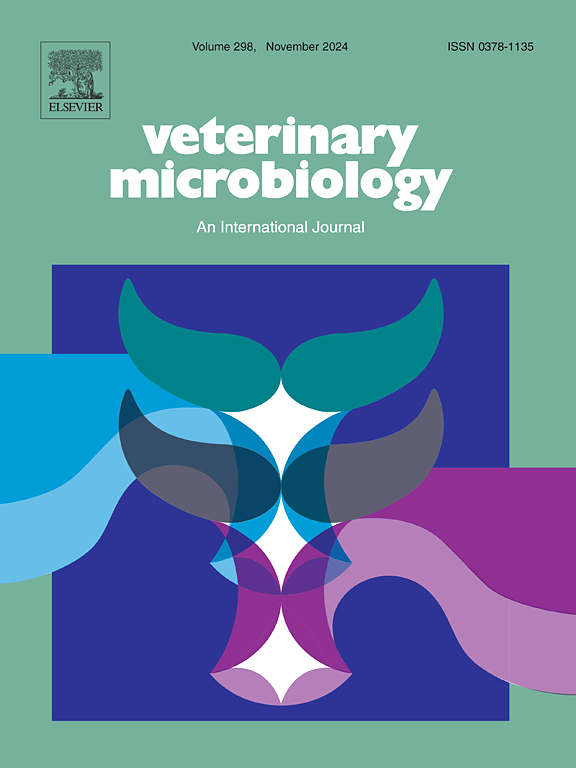Molecular epidemiology, immunobiology, genomics and proteomics insights into bovine brucellosis
IF 2.4
2区 农林科学
Q3 MICROBIOLOGY
引用次数: 0
Abstract
Brucella species are intracellular Gram-negative bacteria that cause brucellosis, a global zoonosis that impacts cattle productivity and public health. Both cattle and buffaloes are susceptible to bovine brucellosis, which can lead to severe degenerative changes in uterine mucosa of non-pregnant animals, including ulcerative endometritis and fibrosis. Vasculitis, localized coagulative necrosis, and ulceration of the uterine mucosa have all been reported in pregnant animals. Male testicles get inflamed due to Brucella, which results in infertility. This review article covers the molecular epidemiology, pathophysiology, immunobiology, genomics, and proteomics of Brucella, with an emphasis on novel discoveries and more recent research, especially on bovine brucellosis. The integration of molecular pathology and sero-prevalence data provide the insights into epidemiology, transmission dynamics, and genetic diversity of bovine brucellosis. The immunobiological response studies of brucellosis have provided insights into the tactics employed by Brucella to infect host cells and elude immune responses. Proteomics was utilized to find biomarkers for both acute and chronic brucellosis, which resulted in the identification of proteins with differential expression linked to immune response, inflammation, and extracellular matrix modulation. The genetic diversity, virulence factors, and evolution of Brucella strains were mostly investigated using genomics. The genomic makeup and architecture of Brucella isolates were examined using whole-genome sequencing, which revealed genetic markers linked to pathogenicity and drug resistance. This review provides possible treatment targets, diagnostic biomarkers, and vaccine candidates, contributing to molecular understanding of bovine brucellosis.
分子流行病学,免疫生物学,基因组学和蛋白质组学对牛布鲁氏菌病的见解
布鲁氏菌属是引起布鲁氏菌病的细胞内革兰氏阴性菌,布鲁氏菌病是一种影响牛生产力和公共卫生的全球性人畜共患病。牛和水牛都易患牛布鲁氏菌病,这可导致未怀孕动物子宫黏膜发生严重的退行性改变,包括溃疡性子宫内膜炎和纤维化。血管炎、局部凝固性坏死和子宫黏膜溃疡都曾在怀孕动物中报道过。男性睾丸会因布鲁氏菌感染而发炎,从而导致不育。这篇综述文章涵盖了布鲁氏菌的分子流行病学、病理生理学、免疫生物学、基因组学和蛋白质组学,重点介绍了新的发现和最近的研究,特别是在牛布鲁氏菌病方面。分子病理学和血清患病率数据的整合提供了对牛布鲁氏菌病的流行病学,传播动力学和遗传多样性的见解。布鲁氏菌病的免疫生物学反应研究提供了布鲁氏菌感染宿主细胞和逃避免疫反应的策略的见解。蛋白质组学被用于寻找急性和慢性布鲁氏菌病的生物标志物,从而鉴定出与免疫反应、炎症和细胞外基质调节相关的差异表达蛋白。布鲁氏菌菌株的遗传多样性、毒力因子和进化等研究主要采用基因组学方法。利用全基因组测序检测了布鲁氏菌分离株的基因组组成和结构,发现了与致病性和耐药性相关的遗传标记。本综述提供了可能的治疗靶点、诊断生物标志物和候选疫苗,有助于对牛布鲁氏菌病的分子认识。
本文章由计算机程序翻译,如有差异,请以英文原文为准。
求助全文
约1分钟内获得全文
求助全文
来源期刊

Veterinary microbiology
农林科学-兽医学
CiteScore
5.90
自引率
6.10%
发文量
221
审稿时长
52 days
期刊介绍:
Veterinary Microbiology is concerned with microbial (bacterial, fungal, viral) diseases of domesticated vertebrate animals (livestock, companion animals, fur-bearing animals, game, poultry, fish) that supply food, other useful products or companionship. In addition, Microbial diseases of wild animals living in captivity, or as members of the feral fauna will also be considered if the infections are of interest because of their interrelation with humans (zoonoses) and/or domestic animals. Studies of antimicrobial resistance are also included, provided that the results represent a substantial advance in knowledge. Authors are strongly encouraged to read - prior to submission - the Editorials (''Scope or cope'' and ''Scope or cope II'') published previously in the journal. The Editors reserve the right to suggest submission to another journal for those papers which they feel would be more appropriate for consideration by that journal.
Original research papers of high quality and novelty on aspects of control, host response, molecular biology, pathogenesis, prevention, and treatment of microbial diseases of animals are published. Papers dealing primarily with immunology, epidemiology, molecular biology and antiviral or microbial agents will only be considered if they demonstrate a clear impact on a disease. Papers focusing solely on diagnostic techniques (such as another PCR protocol or ELISA) will not be published - focus should be on a microorganism and not on a particular technique. Papers only reporting microbial sequences, transcriptomics data, or proteomics data will not be considered unless the results represent a substantial advance in knowledge.
Drug trial papers will be considered if they have general application or significance. Papers on the identification of microorganisms will also be considered, but detailed taxonomic studies do not fall within the scope of the journal. Case reports will not be published, unless they have general application or contain novel aspects. Papers of geographically limited interest, which repeat what had been established elsewhere will not be considered. The readership of the journal is global.
 求助内容:
求助内容: 应助结果提醒方式:
应助结果提醒方式:


